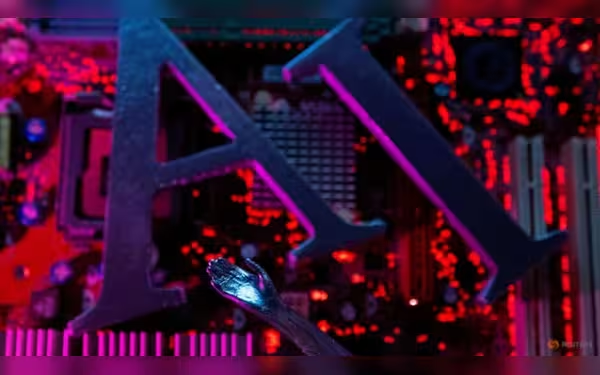Saturday, November 16, 2024 05:51 PM
AI Training Revolution: The Rise of Specialized Human Trainers
- AI models now require specialized human trainers.
- Invisible Tech partners with major AI companies.
- Human expertise is crucial for reducing AI errors.
 Image Credits: channelnewsasia
Image Credits: channelnewsasiaThe evolution of AI training highlights the need for specialized human trainers to enhance AI capabilities and reduce errors.
In recent years, the world of artificial intelligence (AI) has seen remarkable advancements, particularly with models like ChatGPT and its competitors. Initially, these AI systems relied heavily on large teams of low-cost workers to help them understand basic concepts, such as identifying whether an image depicted a car or a carrot. However, as the technology has evolved, the demand for more sophisticated training has surged, leading to a need for a new breed of human trainers with specialized knowledge.
Today, companies like Cohere, which is valued at over $5 billion, are employing highly educated professionals, including historians, scientists, and even licensed physicians, to enhance the capabilities of their AI models. Cohere's co-founder, Ivan Zhang, noted, "A year ago, we could get away with hiring undergraduates, to just generally teach AI on how to improve. Now we have licensed physicians teaching the models how to behave in medical environments, or financial analysts or accountants." This shift highlights the increasing complexity of AI training and the necessity for trainers who possess advanced degrees and expertise.
One of the key players in this evolving landscape is Invisible Tech, a startup that has become a vital partner for many AI companies, including Microsoft and AI21. Invisible Tech employs thousands of trainers from over 100 countries, many of whom hold PhDs or master's degrees. The founder, Francis Pedraza, stated, "We have 5,000 people in over 100 countries around the world that are PhDs, Master's degree holders and knowledge work specialists." This diverse pool of talent allows AI companies to reduce errors, commonly referred to as hallucinations, which occur when AI generates false information.
Invisible Tech's journey began in 2015 as a workflow automation company, but it pivoted to focus on AI training after collaborating with OpenAI in 2022. OpenAI approached Invisible with a pressing issue: early versions of ChatGPT were prone to hallucinations, making it difficult for users to trust the answers provided. As a result, Invisible became an essential partner in providing reinforcement learning with human feedback, a crucial component in training AI models.
Generative AI, which creates new content based on previously gathered data, often struggles to differentiate between true and false information. This limitation can undermine the appeal of AI technologies for businesses. To combat this, companies are increasingly turning to human trainers to instill a clear understanding of fact versus fiction within their AI systems. Since partnering with OpenAI, Invisible has expanded its role as a training partner for numerous generative AI companies.
OpenAI itself has a dedicated team known as the "Human Data Team," which collaborates with AI trainers to gather specialized data for training its models. This team conducts various experiments aimed at reducing hallucinations and improving writing styles, working closely with trainers from Invisible and other vendors. The demand for specialized trainers is on the rise, as AI companies seek to enhance their models across various subjects and languages.
Interestingly, the landscape of AI training is evolving rapidly, with new companies emerging to offer similar services. As the demand for specialized trainers grows, individuals from diverse backgrounds can find opportunities in this field, even without coding skills. The potential for well-paid positions in AI training is becoming increasingly attractive, creating a niche market for those with expertise in various subjects.
The evolution of AI training reflects a broader trend towards specialization in the tech industry. As AI continues to advance, the role of human trainers will become even more critical in ensuring that these systems produce accurate and reliable information. This shift not only highlights the importance of human expertise in technology but also opens up new career opportunities for individuals with specialized knowledge. The future of AI training is bright, and it is clear that smarter human trainers are paving the way for smarter AI.













